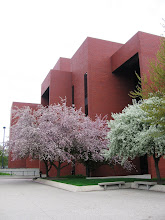BSU Librarians Reflect on Experiences at ALA 2006 Conference
Recently, several librarians from the Ball State University Libraries joined over 17,000 librarians, vendors, and national/international visitors at the American Library Association’s Annual (ALA) Conference which was held in New Orleans June 22-28, 2006. This was the first conference held in the beleaguered city since Hurricane Katrina on August 29.
Mayor C. Ray Nagin said that libraries became a focal point for distributing information to residents and were “center points for bringing our community together.”
First Lady Laura Bush, a former librarian, gave the keynote address to School Libraries Work: Rebuilding for Learning, a national town hall meeting sponsored by the American Association of School Librarians and Scholastic. Local and national government officials, educators, and business leaders from across the United States joined conference attendees to address the critical role school libraries play in restoring learning and reuniting community in times of crisis.
Madeleine Albright, former U.S. Secretary of State, gave remarks during the Opening General Session.
CNN's Anderson Cooper, host of Anderson Cooper 360°, was on hand to share remarks during the Public Library Association President’s program.
Cokie Roberts, who is chief congressional analyst for ABC News, senior news analyst for National Public Radio, and a bestselling author, delivered the closing session.
Some observations and experiences from BSU librarians follow:
Kelli Keclik, Information Services Librarian
At the conference I learned that BSU Libraries are ahead of the game in terms of reaching independent users, both distance learners and millenials. We are already using blogs, rss feeds, instant messaging and other forms of social software, like Myspace, to reach our users. Ball State University Libraries really are cutting-edge cool. I returned to Ball State more eager than ever to connect our users with high-quality information and the love of lifelong learning.
Eric Fisher, Information Services Librarian
During the workshop “Library Website as Branch Site,” the presenter stressed that website developers need to involve library users during the planning stages of web development and to keep their library customers’ needs in mind. At another workshop, the topic information literacy instruction was debated.
I think there is a lot to be said for ALA holding the conference in New Orleans. Librarians are a group of people who are dedicated to the building of communities, traditionally through local library services but also, as this case illustrates, through our patronage, our donations, and our determination to help.
Stacy Chaney, Information Services Librarian
The American Library Association’s 2006 annual conference provided many opportunities for professional development. I attended several interesting sessions including a presentation by Google, a review of college students’ use of technology and their related habits, and a look at how to transform teaching with new technologies.
Informal conversations with colleagues over “po’ boys” and jambalaya led to some interesting discussions about how we might implement these new ideas in the library I also learned a lot about the region by talking with the New Orleans locals regarding their experiences and efforts to rebuild after Hurricane Katrina. In my four days in New Orleans for ALA 2006, I found that everyone, from the bus driver to the conference presenter, had a piece of inspiring information to share.
Matthew Shaw, Electronic Resources Librarian
I spent a good deal of time in the exhibits scouting for new online products and services. I attended a session called “Digital Rights Management and Institutional Repositories,” which focused primarily on the need for institutions to accentuate copyright awareness when creating a repository of digitized faculty and student product.
I also attended a workshop on the future of print and online journal pricing. Scholarly communication continues to struggle to keep information affordable and accessible. Publishers are increasingly requiring some subsidization from authors, and this has the potential to harm the quality of academic information in the future. Many publishers continue to emphasize online products, and some journals are migrating to an online-only format. Unfortunately, this does not necessarily represent a savings for subscribing institutions. Online subscriptions are often marginally more expensive than print.
If the news about pricing futures was disappointing, the growing array of online information sources and services was impressive. Vendors and publishers continue to create diverse collections of online information, and many are selling retrospective products that will replace older print equivalents and offer greater 24/7/365 access to information that was formerly available only in non-circulating and microform collections!
While the convention center and surrounding area were in relatively good condition, our visit to this area of the city was an eye-opening firsthand experience of the disastrous conditions still existing nearly a year after Katrina. The service was an inspirational look at the perseverance of some New Orleans residents in the face of extreme loss and personal difficulty.


0 Comments:
Post a Comment
<< Home